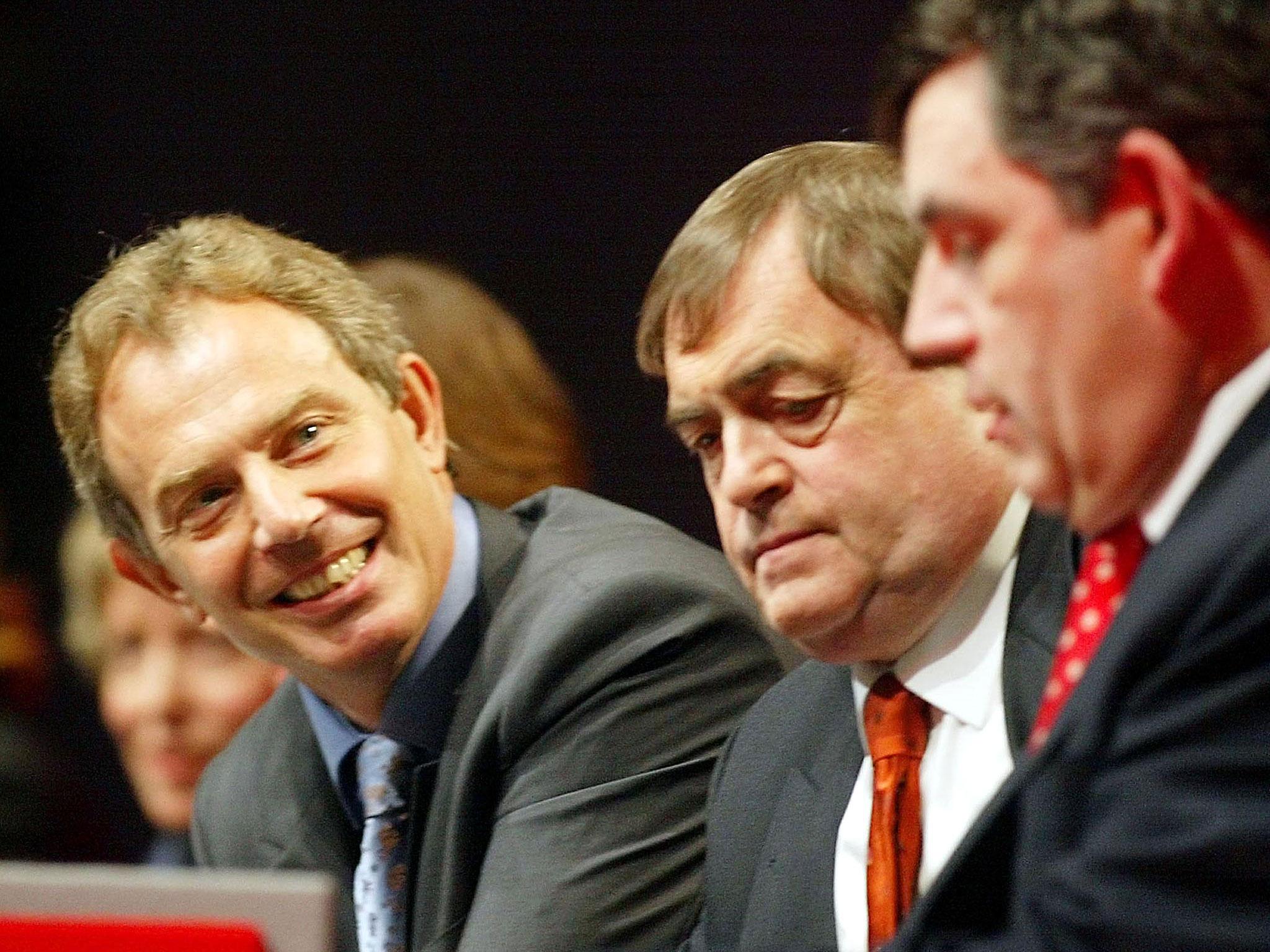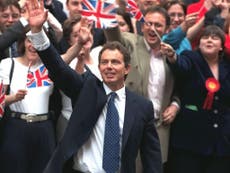20 years after Blair's historic landslide victory, here's why so many of my generation still call themselves Blairites
When I was 14, I watched the country change – but since then it seems to have slid backwards


It is 6 June 1996. Days away from my 14th birthday, I am squeezed onto a bench propped between the lighting rig and the ceiling of my school assembly hall. It is the hottest day of the year; a handful of lower school pupils are crammed up here with me, our legs sticking sweatily to one another as the heat from the growing crowd of sixth form students, the entire teaching staff and the travelling press pack amassing below rises.
I have been fetched out of lessons to witness this spectacle by a form tutor who clearly spotted something gestating in me long before I had any idea of the sort of life I might choose for myself as an adult. Or, perhaps, her quick decision to place me there meant that I was exposed, for the first time, to ideas that would shape me. And if that was the case, I certainly wasn’t alone.
In the rafters of a crumbling comprehensive, we await the arrival of Labour leader Tony Blair, just one year before his landslide election victory. He came to Didcot, to my hometown, to speak about his “new vision” for secondary education, and he left it embroiled in a spat with John Major’s Tories about mixed ability teaching and the benefits, or otherwise, of grammar schools. Plus ça change.
But he also left – as, I’m certain, he left every other campaign trail location – having tapped into a cultural movement for change that was so much bigger than raw politics. Things can be better than this, he implied, and you are the people who will make it better with me.
Less than a year later, and a fraction more mature in my perspective, I watched with excitement and a raw anticipation of the future – my future – as Blair swept to the most convincing political victory in two decades.
And another two decades later, Theresa May’s Conservatives are about achieve something similar. But what marked 1997 out was that this movement was far bigger than the Labour Party. And that movement defined a whole generation of young people, the pre-millennials born between the mid-1970s and the mid-1980s; it certainly defined me.
For all the baggage that the former prime minister’s name drags behind it, at that time Tony Blair was not just a party leader but a sort of talisman for a different British society. For those too young to remember the pre-Iraq War era of New Labour, this can seem hard to fathom. Those old enough to have lived through political boom and bust time and again remember 1997 as another notable moment on the continuum. For those of us coming of age as Blair took to power, Blair was our signifier. We would, together, make sure that the society of our adulthood would not perpetuate the privations of our youth.
It’s easy to forget how much has changed since 1997, and how important Blair’s ascendency was in confirming and securing those shifts that were already beginning to occur, but when you look back at two decades of social progress it’s also easy to see why so many people in their thirties and forties today remain, at heart, Blairites.
In just two decades, British attitudes to same-sex relationships have transformed. In 2000, Labour forced through a change to the age of consent for homosexual partners, making it equal, at age 16, with heterosexual relationships. Now, 20 years on, we have gay marriage and sexuality is rarely a barrier to any form of personal or public achievement.
For young women like me, the sight of so many incoming Labour MPs and ministers on the cobbles of Downing Street in 1997 told us that our future society would include women at the top. Yes, they were labelled “Blair’s babes”, and many hurdles remain, but we’ve never had more women in positions of political and cultural power than we do today, some 20 years on. Blair’s first government was instrumental in making that happen, even if only as an important signifier of where the country already was.
As people are never tired of reminiscing, Blair’s victory wave also coincided with a five-year high for British arts and culture. Britpop and the YBAs ruled the waves. Oasis took America, Blur took the capital, and Suede just took a load of drugs (and all the while, Blair’s ministers, including Mo Mowlam, admitted to the odd puff themselves and called for liberalisation of drug laws).
These were heady moments for British culture. Blair’s response was sympathetic to that appetite. He committed to generous investment in the arts after decades of malnourishment under the Tories. Whether art ever truly flourishes in the good times is a moot argument; my generation took culture seriously, and now so did our leaders.
Blair’s big idea, the cultural phenomenon he aimed to represent – and an idea which he expressed quite clearly on his day trip to Didcot in 1996 – was meritocracy. My generation had already had that idea, but previously felt their political leaders didn’t seem to care very much for what we could achieve, given the chances. Suddenly, that changed.
Two decades on, for many of us, that sudden shift that took place on 2 May 1997 when Blair walked into Downing Street, still matters.
Yes, there’s still work to do now on building the society that we had our minds set upon. Britain in the mid-1990s was a racist country; in the wake of Brexit, can we say it is much different today? The EU referendum, and now the general election campaign, took the lid off something latent in our society. Tolerance has receded.
It’s notable that Elastica, another celebrated band from the Britpop era, chose to reissue their self-titled 1995 debut album this month, as just another general election campaign gets underway. In an interview, the band’s lead singer, Justine Frischmann, herself a female icon of the 1990s, said she felt those songs deserved a second listen in 2017. They have something to say to us today. Perhaps she’s right; as Britain fragments in the wake of Brexit, we need to hear those same messages of individuality and acceptance once again.
Tony Blair has, of course, long since lost his resonance as a cultural figure. That would have happened inevitably over the two decades that followed; the promise of such a man is always too great to meet expectations, especially when that expectation is so youthful. The calamity of the Iraq War and his too-close relationship with George Bush only sped up the inevitable on the domestic front.
But Blair and his moment on the morning of 2 May 1997 was always bigger than party politics. It was an era-defining moment, and that era defined so many of us. It’s not too strong to say that those short months helped to make me who I am.
So criticise Blair all you like, but don’t underestimate the significance of his victory. And the eve of another landslide – one that’s slipping away in the opposite direction – don’t forget that he is also the last Labour leader this country ever elected. The promise of a generation, now a generation in its economic prime, is still waiting to be fulfilled.



Join our commenting forum
Join thought-provoking conversations, follow other Independent readers and see their replies